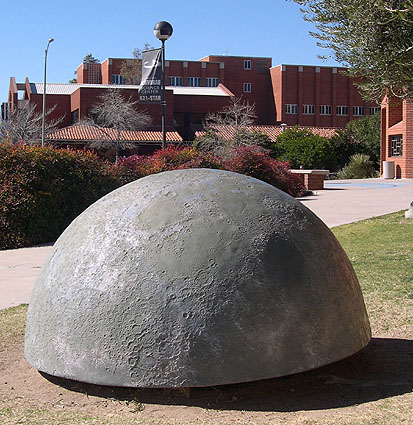Difference between revisions of "March 9, 2004"
| Line 8: | Line 8: | ||
<tr> | <tr> | ||
<td colspan="2"><div align="center"> | <td colspan="2"><div align="center"> | ||
| − | [javascript:;" onMouseOver="MM_swapImage('main_image','','images/LPOD-2004-03-09b.jpeg',1)" onMouseOut="MM_swapImgRestore() | + | ["javascript:;" onMouseOver="MM_swapImage('main_image','','images/LPOD-2004-03-09b.jpeg',1)" onMouseOut="MM_swapImgRestore()" |
[[File:LPOD-2004-03-09.jpeg|LPOD-2004-03-09.jpeg]]]</div> | [[File:LPOD-2004-03-09.jpeg|LPOD-2004-03-09.jpeg]]]</div> | ||
</td> | </td> | ||
Revision as of 20:59, 4 January 2015
Half Moon in Tucson
Image Credit: Chuck Wood |
|
Half Moon in Tucson Lunar globes are rare and wonderful. At one time I had the small metal Replogle globe and I still possess a tiny NASA one plus my joy - a 12" Soviet-era globe that has unfortunately suffered plate tectonic ruptures from too many moves. The largest globe still standing that I am aware of is actually this 5 ft diameter hemisphere outside the Flandrau Science Center on the University of Arizona campus in Tucson. I have never seen any student stop to look at the globe, but I always do. The depiction of the lunar surface is both detailed and schematic. Detailed in the sense that all the major craters are present at the correct relative size, and schematic in that in some places there seems to be just a jumble of pits. Move your mouse over the image to see a close up of the section from the Apennines to Archimedes to Cassini. The original lunar hemisphere was made for JPL and it is mounted on the wall inside the Flandrau. The Flandrau exhibit staff made two casts of the hemisphere. One is pictured here and the other was given to the Arizona School for the Deaf and Blind - a tactile lunar globe to promote lunar astronomy! Are there other large lunar globes in existence? Related Links: Tomorrow's LPOD: ESA Looks at Taruntius |
|
Author & Editor: Technical Consultant: A service of: |
COMMENTS?
Click on this icon File:PostIcon.jpg at the upper right to post a comment.




